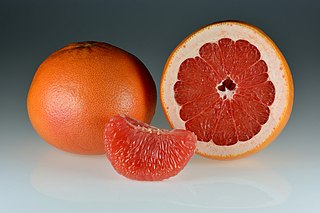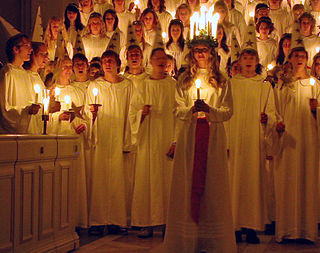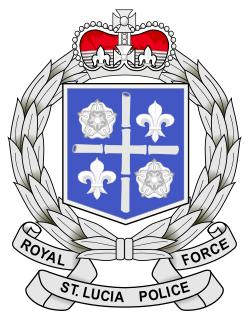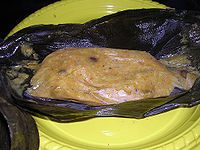
Saint Lucia is an island country in the West Indies in the eastern Caribbean Sea on the boundary with the Atlantic Ocean. The island was previously called Iouanalao, the name given to the island by the native Arawaks, and later Hewanorra, the name given by the native Caribs, two separate Amerindian peoples. Part of the Windward Islands of the Lesser Antilles, it is located north/northeast of the island of Saint Vincent, northwest of Barbados and south of Martinique. It covers a land area of 617 km2 and reported a population of 165,595 in the 2010 census. St. Lucia's largest city is Castries, its current capital, and its second largest is Soufrière, the first French colonial capital on the island.

A tamale, in Spanish tamal, is a traditional Mesoamerican dish made of masa, a dough made from nixtamalized corn, which is steamed in a corn husk or banana leaf. The wrapping can either be discarded prior to eating or used as a plate. Tamales can be filled with meats, cheeses, fruits, vegetables, herbs, chilies, or any preparation according to taste, and both the filling and the cooking liquid may be seasoned.

The grapefruit is a subtropical citrus tree known for its relatively large, sour to semi-sweet, somewhat bitter fruit. The interior flesh is segmented and varies in color from pale yellow to dark pink.

Cornmeal is a meal or a cell membrane ground from dried corn. It is a common staple food, and is ground to coarse, medium, and fine consistencies, but not as fine as wheat flour can be. In Mexico, very finely ground cornmeal is referred to as corn flour. When fine cornmeal is made from maize that has been soaked in an alkaline solution, e.g., limewater, it is called masa harina, which is used for making arepas, tamales and tortillas. Boiled cornmeal is called polenta in Italy and is also a traditional dish and bread substitute in Romania.

Cornbread is a quick bread made with cornmeal, associated with the cuisine of the Southern United States, with origins in Native American cuisine. It is an example of batter bread. Dumplings and pancakes made with finely ground cornmeal are staple foods of the Hopi people in Arizona. The Hidatsa people of the Upper Midwest call baked cornbread naktsi. Cherokee and Seneca tribes enrich the basic batter, adding chestnuts, sunflower seeds, apples or berries, and sometimes combining beans or potatoes with the cornmeal. Modern versions of cornbread are usually leavened by baking powder.
The music of Saint Lucia is home to many vibrant oral and folk traditions and is based on elements derived from the music of Africa, especially rhythmically, and Western Europe, dances like the quadrille, polka and waltz. The banjo and cuatro are iconic Lucian folk instruments, especially a four-stringed banjo called the bwa poye. Celebratory songs called jwé show lyricism, and rhythmic complexity. The most important of the Afro-Lucian Creole folk dances is the kwadril. Music is an integral part of Lucian folk holidays and celebrations, as well as the good-natured rivalry between the La Rose and La Marguerite societies. There is little Western classical music on Saint Lucia, and the country's popular music industry is only nascent. There are few recording opportunities, though live music and radio remain a vital part of Lucian culture. Popular music from abroad, especially Trinidadian styles like calypso and soca, is widespread.

Saint Andrew's Day, also called the Feast of Saint Andrew or Andermas, is the feast day of Andrew the Apostle. It is celebrated on 30 November. Saint Andrew is the disciple in the New Testament who introduced his brother, the Apostle Peter, to Jesus, the Messiah. He is the patron saint of Scotland and Tajikistan.

Saint Lucy's Day, also called the Feast of Saint Lucy, is a Christian feast day observed on 13 December. The observance commemorates Lucia of Syracuse, an early-4th-century virgin martyr under the Diocletianic Persecution, who according to legend brought food and aid to Christians hiding in the Roman catacombs, wearing a candle lit wreath on her head to light her way and leave her hands free to carry as much food as possible. Her feast day, which coincided with the shortest day of the year prior to calendar reforms, is widely celebrated as a festival of light. Falling within the Advent season, Saint Lucy's Day is viewed as a precursor of Christmastide, pointing to the arrival of the Light of Christ in the calendar on Christmas Day.

The culture of Barbados is a blend of West African and British cultures present in Barbados. English is the official language of the nation, reflecting centuries of British influence, but the Bajan dialect in which it is spoken is an iconic part of the Barbadian culture. This dialect is a combination of the languages from the different inhabitants in its history.
The culture of St. Kitts and Nevis, two small Caribbean islands forming one country, has grown mainly out of the West African traditions of the slave population brought in during the colonial period. France and British colonists both settled the islands, and for a period of time the British imported indentured Irish servants. The native Caribs, skilled warriors, defended their lands by attacking the colonies. But by 1782, the British had gained control of St. Kitts and Nevis, which they retained until granting the islands their independence in 1983. British influence remains in the country's official language, English, while some islanders speak an English-based Creole. The influence of the French, Irish, and Carib seems less pronounced.
Cou-cou, coo-coo, or fungie makes up part of the national dishes of Antigua and Barbuda, Barbados, British Virgin Islands and the U.S. Virgin Islands. It consists mainly of cornmeal and okra (ochroes). Cornmeal, which comes readily packaged and is available at supermarkets islandwide, and okra, which can be found at supermarkets, vegetable markets and home gardens, are very inexpensive ingredients. Because these main components are inexpensive, the dish became common for many residents in Barbados' early colonial history. In Ghana, a similar meal of fermented corn or maize flour eaten with okra stew and fish is known as banku, a favourite dish of the Ga tribe in Accra.

The Royal Saint Lucia Police Force (RSLPF) is the agency responsible for law enforcement in Saint Lucia. It was founded in 1834.

This is a timeline of the territorial evolution of the Caribbean and nearby areas of North, Central, and South America, listing each change to the internal and external borders of the various countries that make up the region.

The Rugby Americas North Women's Sevens, or RAN Women's Sevens, is the regional championship for women's international rugby sevens in North America and the Caribbean. The tournament is held over two days, typically on a weekend in November. It is sanctioned and sponsored by Rugby Americas North, which is the rugby union governing body for the region. Prior to 2016, it was referred to as the North America and Caribbean Women's Sevens.

"In Plenty and In Time of Need" is the national anthem of the country of Barbados. It was written by Irving Burgie and was composed by C. Van Roland Edwards. As one part of the West Indies Federation from 1958 to 1962, Barbados' anthem was supposed to be "Forged from the Love of Liberty", however the current anthem was created with Barbados's moves toward full independence. The song was then adopted by Barbados when it became independent in 1966.
Barbadian cuisine, also called Bajan cuisine, is a mixture of African, Portuguese, Indian, Irish, Creole, Indigenous and British background. A typical meal consists of a main dish of meat or fish, normally marinated with a mixture of herbs and spices, hot side dishes, and one or more salads. The meal is usually served with one or more sauces.
The following lists events that happened during 2021 in the Caribbean.
The following lists events that happened during 2022 in the Caribbean.












